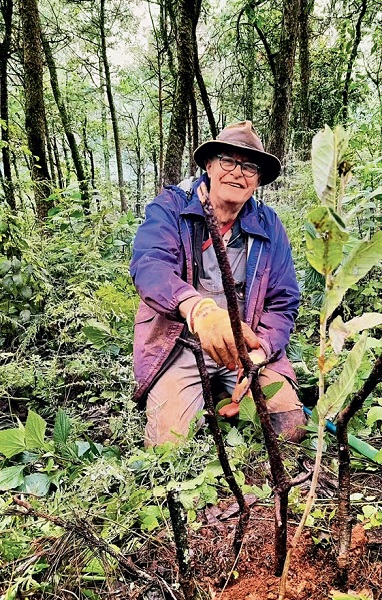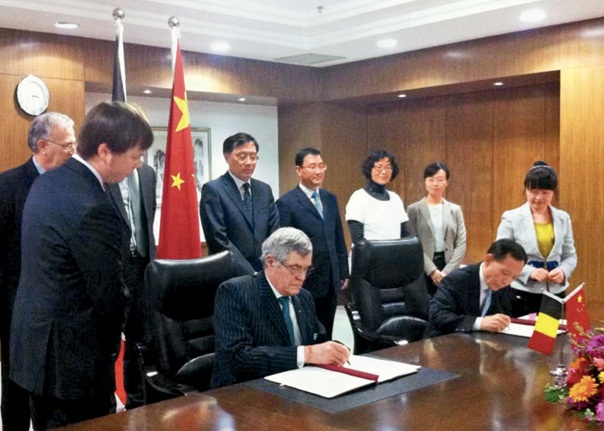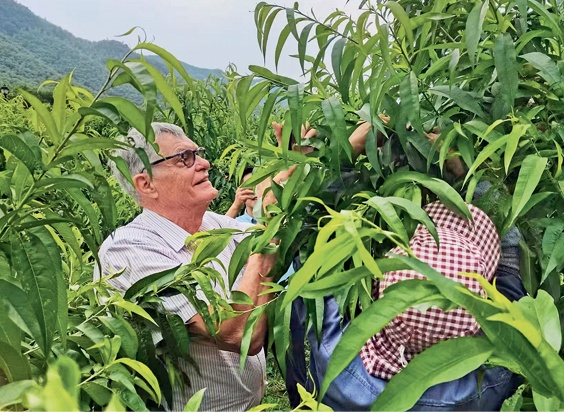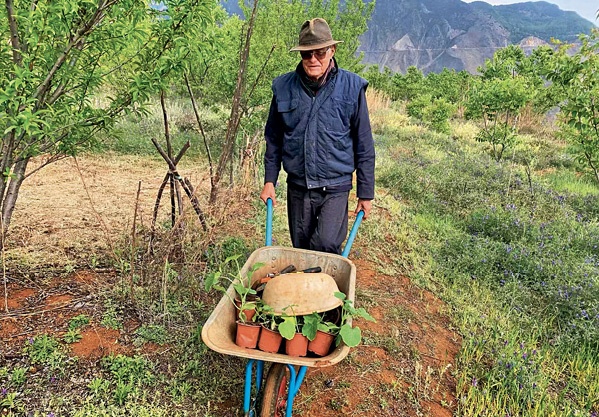Captivated by the enduring wisdom of traditional Chinese culture and the country’s modern transformation, Patrick Nijs, former Belgian ambassador to China, chose to take root in the country after retirement and bring his visionary green dream to life.

Former Belgian Ambassador to China, Patrick Nijs, plants a chestnut tree in the pine woods at his Kabissa Organic Farm in Yunnan Province, as part of his efforts to promote forest biodiversity and ecological sustainability.
In the rugged terrains of Dongchuan, Yunnan Province – a region dubbed China’s “Mudslide Natural Museum” – lies an unlikely sanctuary: Kabissa Organic Farm. Here, retired Belgian diplomat Patrick Nijs, former ambassador to China (2009-2013), cultivates not just crops but a vision of planetary harmony. Rejecting synthetic fertilizers, pesticides, and machinery, Nijs embraces traditional Chinese farming as humanity’s last hope for planetary salvation.
Nijs holds a unique distinction as the only European ambassador to choose permanent residency in China after retirement. His decision, announced upon stepping down from his diplomatic role in 2013, stems from a profound conviction: “What happens to China and within China will shape the globe’s destiny.” Foreseeing the nation’s ascent as a global power, he added, “I wanted to remain close to this epicenter of change. Bridging understanding between China and the world is one of the most pressing tasks of our time.”

The then Belgian Ambassador to China, Patrick Nijs, signs a trade agreement with the Chinese Ministry of Agriculture and Rural Affairs in 2012, facilitating the import of prized Belgian horses to China.
A Pull to China
Born into a Belgian diplomatic family in Congo, Africa, Nijs forged an innate bond with nature during childhood – barefoot adventures through rainforests fostering a profound reverence for the natural world. This early immersion in Africa’s unparalleled biodiversity left an indelible mark, shaping his identity as a lifelong environmental advocate. “I felt profoundly fortunate to grow up surrounded by such ecological richness,” he reflected. Witnessing the rapid extinction of species due to deforestation deeply troubled him, igniting a lifelong commitment to planetary stewardship.
During his secondary education in Belgium, a serendipitous encounter with the ancient Chinese work Tao Te Ching by the ancient Chinese sage Laozi became a turning point. The text’s emphasis on harmony with nature – positioning humanity not as a conqueror but as an integral part of the cosmos – resonated with his African experiences. Here, Laozi’s philosophy crystallized into a spiritual compass, propelling Nijs toward a profound yearning for China.
“My generation was very interested in China’s transformation under Chairman Mao Zedong,” he recalled in an interview with China Today. “We tried to understand what these big changes meant for the global development.”
This intellectual curiosity and philosophical kinship propelled Nijs into diplomatic service in China: first as Belgium’s consul general in Shanghai (1997), and later as ambassador in Beijing (2009).
When asked to define his cultural identity, he said: “I am a global citizen – a mosaic of Chinese, European, and African influences. My roots now anchor in China, evolving into an ‘international Chinese Buddha-being’.”
Taoist philosophy profoundly structures Nijs’ worldview. “Eastern thought unifies body, mind, and universe – humans are not separate entities but a vibrational part of the universe,” he explained. This holistic paradigm, he argued, prioritizes symbiotic coexistence over Western paradigms of domination: “It’s a big difference [from the Western thinking]. It’s not like we have to fight, we have to impose ourselves, we have to prevail, we have to dominate. It’s a mixture of yin and yang, masculine and feminine energy, which is much softer and much more comprehensive and where man actually has to find its right place in the universe.”
Inspired by oriental philosophy, Nijs believes we have to find a kind of reconciliation between man and nature, saying “there was no other way if you wanted to generate happy people and healthy people.” In his view, if people want to be in harmony with their surroundings and be happy, oriental philosophy holds the key. “The Taoism is the engine that keeps me alive and feeds me. And this is why I have to get back to the countryside whenever it’s possible, to be close to nature.”
Nijs further pointed out the different understandings of freedom and their respective approaches to governance in the East and West. “Asian people tend to think of themselves as part of the community, feeling the need to serve the community, but people in the West tend to put themselves first,” he noted. “We have a crisis on this in Europe. We have been too far with the freedom,” Nijs said, adding that this has led to chaos.

Patrick Nijs harvests sun-ripened peaches at his Kabissa Organic Farm in Yunnan Province, highlighting the farm’s dedication to sustainable, chemical-free agriculture.
A Chinese Farming Dream
Chinese philosophy has also shaped Nijs’ daily routine. Nijs rises with the sun, and practices both sitting and standing meditation inspired by the teachings of Zen and Taoism as he faces the sunrise. Being close to nature, he believes, fills him with energy and connects him to the universe. After meditation, he studies and practices writing Chinese characters, fascinated by their etymology. To him, these characters reveal much about Chinese psychology and thought.
Before breakfast, Nijs takes a morning walk through his permaculture farm of about two hectares which he runs together with his Chinese wife Deng Minyan. “Our fields are like an edible forest,” he explained. “They’re composed of multiple layers – vegetables, trees, shrubs – all part of a living ecosystem that produces food.” In the early hours, Nijs simply observes, using his senses to understand the farm’s rhythms and the growth of new plants. After breakfast, he often works in the fields until dusk.
Though a foreigner, Nijs is deeply committed to preserving traditional Chinese farming methods. “Traditional Chinese farming is disappearing, and that worries me,” he told China Today. Nowadays, only elderly farmers retain this knowledge, which Nijs greatly values. “They till the land using simple techniques, avoiding those destructive machines that ruin the soil’s structure.” He finds the traditional practice of intercropping – growing different plants together – particularly fascinating. “This biodiversity is very close to permaculture’s principles.”
Nijs loves being a farmer in China because, to him, Chinese farmers embody the essence of farming. “I adore Chinese farmers – they’re wonderfully simple people. You don’t need many words; just sitting together feels good.”

Patrick Nijs prepares to plant squash crops at Kabissa Organic Farm, embodying his hands-on approach to organic farming and environmental stewardship in rural Yunnan.
Green China, Green World
Nijs is deeply concerned about the looming threats of climate change and biodiversity loss, which he believes are accelerating the extinction of Homo sapiens. In his view, cooperation between China and Europe will be key to addressing this crisis.
“We face immense challenges. Yet today, people are so distracted by geopolitics that they overlook the deterioration of our global ecosystems.”
Europe’s tradition of multilateralism, he argued, offers a path forward. “Our history has taught us the devastation of war and colonialism. Now, we must join forces with China to restore multilateralism and steer the world in the right direction.”
To strengthen global efforts in ecological preservation and green development, Nijs co-founded the Wutong-Acacia International Forum, aiming to “bridge Europe and China in determined, innovative action to prevent the collapse of our planet’s ecosystems.”
The forum brings policymakers, experts, and business leaders to Moganshan (Mount Mogan), a natural sanctuary in Huzhou of Zhejiang Province, to advance the circular economy. “We avoid politics, opting instead for symbolic resonance. The Wutong, a Chinese tree, attracts and protects the phoenix – a mythical bird reborn from ashes. It’s a powerful emblem of renewal. The Acacia, from Greek mythology, symbolizes knowledge and longevity. It’s a pioneer species, the first to regenerate forests, sacrificing itself to restore biodiversity.”
At the inaugural forum in
December 2023, participants adopted the Moganshan Declaration, affirming: “Our mission is to champion green innovation. As a global power, China’s role is pivotal – without its participation, effective solutions remain a mirage. We strive to bring a green China to the world and a green world to China, a vital step toward a shared future for humanity.”
Nijs praised China’s green development achievements, noting its steady progress under the ecological civilization framework. “China may surpass its own targets for carbon peak and neutrality,” he said, highlighting the country’s strides in ecosystem restoration, expansion of national parks, pollution control, and waste management. “Across China, garbage sorting and recycling efforts are visible, embedding reuse into the circular economy. In green energy and transportation, China now leads globally.”
“China is emerging as a pilot in green transition, while Europe remains a pioneer. Our task is to align efforts across both regions,” he continued, emphasizing Sino-European collaboration to support sustainable development in Africa.
“We must explore every possible channel to unite Europe and China – acting, innovating, and creating together to secure our survival on this planet.”